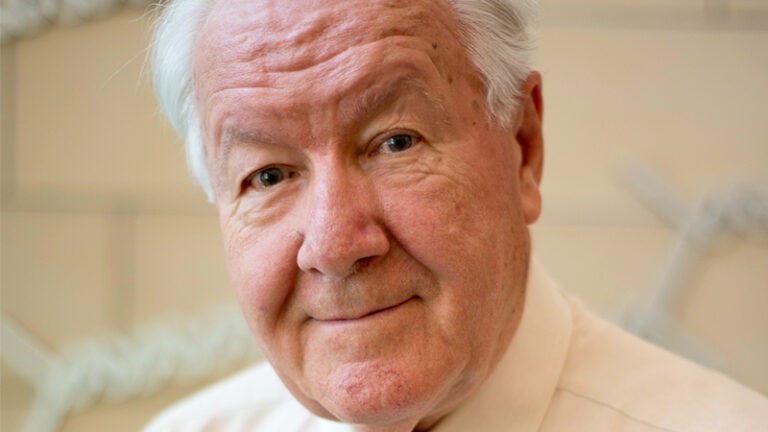
In Memoriam: John Petruska
On the morning of Feb. 14, just as he has done since the mid-1970s, John Petruska, professor of biology at USC Dornsife College of Letters, Arts and Sciences, took the bus from his home in San Marino, California, to Union Station in downtown Los Angeles, and then waited for the USC shuttle.
At 86, Petruska — a DNA and protein structure expert and a fixture at USC since September 1968, when he joined the faculty as an associate professor in molecular biology — was still teaching at the university.
On Valentine’s Day, he was scheduled to teach an advanced course in biochemistry, lecturing undergraduates on new gene editing techniques. Sadly, he collapsed and died while waiting for the shuttle.
Petruska’s passing shocked his wide circle of friends and admirers at USC and in the fields of chemistry, biology and physics at large — as well as his surviving two sons, Mark Petruska, 57, a mayor and a contractor, and David Petruska, 60, a neurosurgeon living in Florida. Both are graduates of USC.
“He was a loving, warm man who didn’t have a mean bone in his body,” said Mark Petruska, who is serving his third term as the mayor of the City of Broeck Pointe, a suburb of Louisville, Ky. “People absolutely loved my dad. Nobody was a stranger to him.”
Skipped two grades
John Petruska was born to immigrants from Czechoslovakia on Feb. 6, 1933. He was raised in a poor mining town in rural northeastern Canada.
His father got him a chemistry set when he was 5, sparking what would become his lifelong unquenchable intellectual curiosity about science — in particular, chemistry, biology and physics.
Petruska was so bright that he skipped two grades and got a full-ride scholarship at age 16 to Bishop’s University in Lennoxville, Quebec, according to his son, Mark. There, he earned a bachelor’s degree in chemistry and physics.
Petruska went on to earn a master’s in physical chemistry at McMaster University in Hamilton, Ontario. He earned his doctorate in chemical physics at the University of Chicago.
Petruska held a post-doctoral position at Caltech, working with Nobel laureate Linus Pauling, before he joined the faculty at USC Dornsife. He continued to train with the best. In 1975, he spent a year in Cambridge, England, on sabbatical working with the likes of Nobel Prize-winner Francis Crick of DNA discovery fame.
Colleagues fondly remember
Myron Goodman, professor of biological sciences and chemistry at USC Dornsife, was a close colleague and friend. He published 19 papers with Petruska, the first in 1985 and the final in 2017.
“He was extremely thoughtful and deeply committed to understanding all he could about biology and chemistry,” Goodman said.
Petruska was widely respected in his fields of research and teaching, Goodman said.
“People really appreciated his unique take on things,” Goodman said. “He was a thinker and an avid seminar-goer who would always ask questions that were extremely insightful.”
Added Goodman: “He saw analogies really well. He could pick out correlations easily and come up with a model based on those correlations. He was a very good, very high-level empirical thinker.”
Professor Emeritus of Biological Sciences Bob Baker also was a close friend. Baker joined the USC Dornsife faculty the same time Petruska did.
Over the years, Baker and Petruska would spend many lunches together, tossing around questions and ideas like youngsters out playing catch with a football, as Baker put it in a blog post.
Petruska “marveled at the universality of the genetic code and the ways that higher biological cells differentiate into [other] kinds of cells, [all within] the same organism,” Baker wrote.
“And though he saw what everyone else was seeing in the natural and physical world, he seemed to always come up with ideas that were entirely different and new,” Baker wrote.
According to Baker, Petruska believed that being an educator was just as important as being a scientist.
“John was always willing to impart his knowledge and speak on topics that were of great interest to him,” Baker wrote. “Students noted his passion and enthusiasm.”
Baker said Petruska had a genuine knowledge that ranged from philosophy to sociology to the sciences.
According to Baker, in the weeks before his death, Petruska was on to a great idea that potentially could solve the enigma of how cells can program their own differentiation over time during repeating rounds of mitosis.
Petruska’s wife of 50 years, Martha Ann “Marti” Petruska, a longtime docent at The Huntington Library, Art Collections, and Botanical Gardens in San Marino, preceded her husband in death on July 4, 2008.
John Petruska was buried at San Gabriel Cemetery following Feb. 21 services at Church of Our Savior in San Gabriel, California.